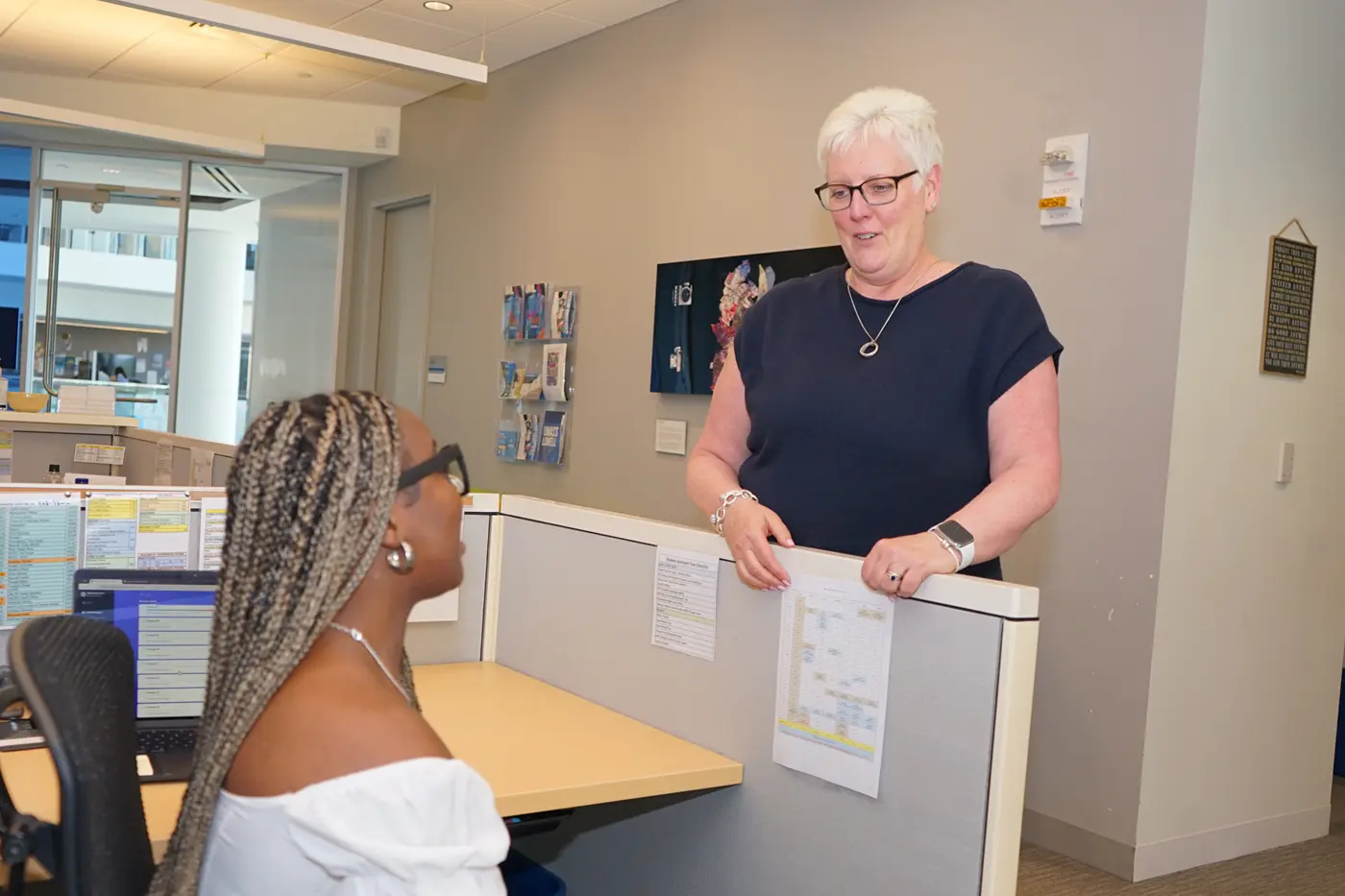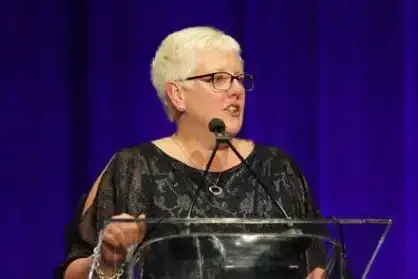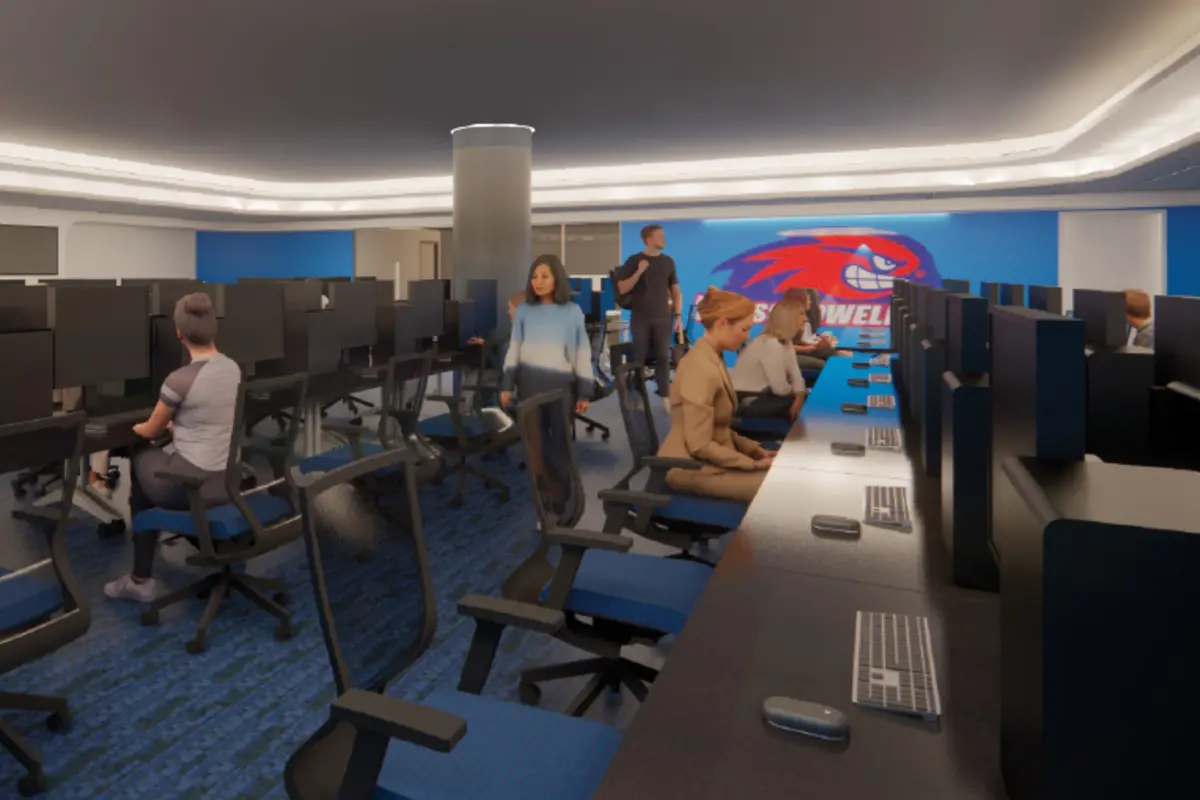 Image by Ed Brennen
Image by Ed Brennen
Dean of Student Affairs and Wellness Brenda Evans, who was recently recognized by the Association of College Unions International for her campus community-building efforts, chats with graduate fellow Shakira Fedna '23, '25.
Dean of Student Affairs and Wellness Brenda Evans ’94, ’95 still gets choked up when talking about her recent honor from the Association of College Unions International (ACUI).
“The folks in that association have shaped the professional that I am — and the person that I am,” says Evans, a 25-year ACUI member who received the organization’s most prestigious honor, the Butts-Whiting Award, at its annual conference this spring in New York City.
With more than 500 member institutions, ACUI is a professional organization that supports “campus community builders” working in student engagement and college unions (aka student centers, such as UMass Lowell’s University Crossing). The Butts-Whiting Award recognizes outstanding leaders in ACUI who have made significant contributions to their universities.
Evans has worked at UMass Lowell for nearly 30 years, ever since completing a bachelor’s degree in psychology and master’s degree in criminal justice at the university. She joined ACUI at the encouragement of Mary Connelly, her former boss in Student Affairs.
Starting as a budget manager at the regional level, Evans has gone on to serve in various leadership roles within ACUI, including as president during the height of the COVID-19 pandemic.
 Image by ACUI
Image by ACUI
Dean of Student Affairs and Wellness Brenda Evans accepts the 2025 Butts-Whiting Award during the Association of College Unions International's annual conference in New York.
Evans attended the conference with fellow ACUI members Adam Dunbar ’11, ’13, director of student affairs, and Amy Liss, director of multicultural affairs. Associate Director of Student Life and Well-being Hannah Monbleau ’21 also attended and received the Collaborative Program of the Year award for the Unwind Your Mind digital wellness campaign.
Evans had no idea she was this year’s Butts-Whiting honoree until the moment her accomplishments were read aloud during the conference’s closing banquet. Her husband, Joss, was secretly flown in and was seated in the audience.
“I was shocked. It’s such an honor,” says Evans, a Lowell native who recently spoke about her role as dean of student affairs and wellness.
How has your involvement with ACUI shaped your work here at UMass Lowell?
I am sort of the quiet leader in the back of the room who does a lot of observations, and I think I fine-tuned a lot of my skills by being involved with ACUI. I co-chaired a restructuring taskforce that had to redraw the association’s map from 15 regions down to eight. I have some strong opinions, but I learned how to be open to other ideas and navigate that, which works well in any industry, but especially in higher education. It has also given me practical experience: I learned a lot about finances, managing teams and building networks, which carried over to my work here. These volunteer roles are a great way for young people working in student affairs to gain professional development.
Can you share an example of how ACUI has made a difference for UML students?
University Crossing exists in part because of ACUI. We bring undergraduate students to the ACUI regional conferences, and one year we brought Adam Dunbar and Mike Mizzoni (’11), who were members of student government. The conference was at the University of Vermont, which had just opened its brand-new student center. Adam and Mike came back and asked, “Why can’t we have that?” They met with campus leaders and advocated for a student center, and it just so happened to align with a period of strategic growth on campus. But I'm not sure how that would have played out if they hadn’t seen another student center and recognized what the building could bring, not only in terms of programming space, but also the community that could be built around having that space.
What are some of the biggest challenges in your role today?
Students are craving connection and community. We had nearly 4,600 students engaged in clubs and organizations this year, which was our strongest year since the pandemic. Data from the Student Government Association’s annual survey tells us that 91% of our students want face-to-face, in-person interaction. That’s why the work that Hannah and (graduate fellow) Shakira Fedna have done with the Well-being Leaders program and Unwind Your Mind campaign has been so important.
How does your experience as a UML student shape your approach to your work?
I was a nontraditional student. I started at Middlesex Community College and flunked out after the first year. I worked full-time for a number of years and then woke up one day and realized that I really need a college degree. I came back to school at UML as a commuter student, working part time and living at home, so I wasn’t involved in clubs or student leadership. Now, I completely understand the importance of being engaged. The co-curricular experience, in my humble opinion, is just as important for students as the curricular experience. It shapes who they are as individuals and teaches them lessons and skills that they might not otherwise learn in the classroom.
Looking ahead, what excites you most about your work at UMass Lowell?
 Image by courtesy
Image by courtesy
An artist rendering of Rowdy's eSports Arena, which is scheduled to open at University Crossing this fall.
